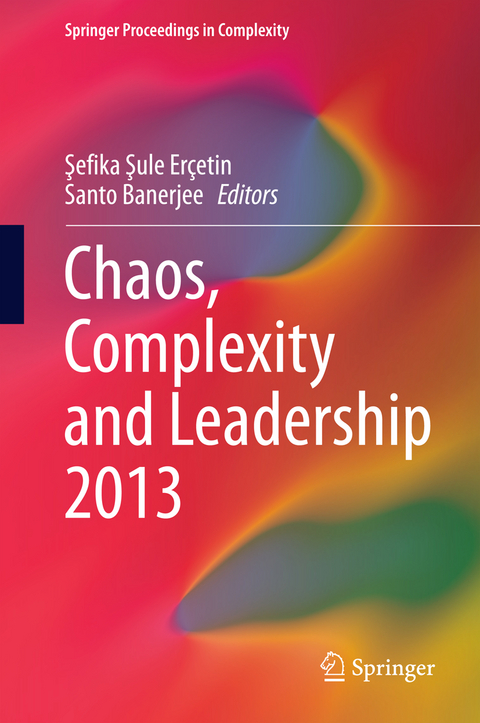
Chaos, Complexity and Leadership 2013
Springer International Publishing (Verlag)
978-3-319-09709-1 (ISBN)
1 Solution to Chaotic Situations in Higher Education: New Generation Universities as Intelligent Organization- 2 From Chaos to Cosmos: Strategic Depth and Turkish Foreign Policy in Syria.- 3 History, Development and Trend of Fractal Base Biometric Cryptography.- 4 The Incorporation of Fractals into Educational Management and its Implications for School Management Models.- 5 Cleopatra's Nose and Complex International Politics.- 6 Complexity Theory in Public Administration and Metagovernance.- 7 Limits and Criticalities of Predictions and Forecasting in Complex Social and Economic Scenarios: A Cybernetics Key.- 8 Leadership in the Formation and Change of School Culture.- 9 Differential Entropy Dynamics: A Possible Cause of Coherence Resonance.- 10 Reliability Properties of Systems with Three Dependent Components.- 11 Cryptosystems Based on Chaos Theory.- 12 Understanding Chaos and Complexity in Education Systems through Conceptualization of Fractal Properties.- 13 Chaotic Pseudorandom Sequences and the Security of Cryptosystems.- 14 Object Oriented Modelling of Corporate Complexity Performance Balance Card: CBBC.- 15 Chaotic Awareness in Gezipark.- 16 Unraveling the Complexity of Tourist Experience with NFC Technology and Mobile Wallets.- 17 Protection of Fundamental Rights and Freedoms as a Universal Problem and Chaos Theory.- 18 The Use of Systems Approach in Psychological Counseling and Guidance.- 19 Using Balance Theory for the Sequential and Correlated Development of Vision, Strategies and Projects in Complex Environments.-20 Chaotic Interaction in Abnormal Leadership Processes from the Perspective of Leaders and Followers.- 21 A Comparative study on three different types of music based on same Indian Raga and their effects on Human Autonomic Nervous Systems.- 22 Injustice as a Judicial Product: A Problematic Tendency in Legal Thinking and Practice.- 23 Selected Indicators and Methods for Evaluation of eParticipation.- 24. Stock Market Development andEconomic Growth: An Empirical Analysis between Turkey and BRICS Countries.- 25 Teachers' and Principals' Views on Principals' Characteristics and Importance of Principal's Characteristics in Chaos.- 26 Social Networks: Connections in Structures.- 27 Leadership in the Future Experts' Creativity Development with Scientific Research Activities.- 28 The Conflict Management Styles used by Managers of Private Primary Schools: An Example of Ankara; S. ÇELIK.- 29 Contemporary Leadership Theories.- 30 Comparison of the Models Adopted Regarding the Training and Appointment of School Administrators (Turkey, France, Denmark and England Sample.- 31 Complexity of Leadership in the Context of Political Governance in Niger.- 32 The Development and Modernization of Minangkabau People in Sumatera Barat in Indonesia and Its Impact on Local Identity.- 33 Family Leadership for Development of Rural Malay Herbal Entrepreneurship in Malaysia.- 34 Evaluating the Application of Possibility and Equality of Opportunity in Higher Education According to Chaos Theory.- 35 Chaos in Secondary Education Programs and Textbooks in Terms of Literature from Turkish Republic to Today.- 36 Assessing the Impact of Project Atmosphere and Leaders on Risk Management in Chaotic Environments.- 37 The Main Problems of High-Quality Training of Future Specialists.- 38 An Evaluation of the Classroom Teachers' Attitudes towards the Constructivist Approach According to Complexity Theory: A Case of Mersin.- 39 The Impact of Human Resource Management Functions on Corporate Image.- 40 Is It Really A Sisyphus Torture? Political Economy of Everyday Life.- 41 Competence-Based Approach in the System of Forming Deontological Preparedness of Specialists.- 42 Rural Malay Youth Leadership and Malaysian Herbal Entrepreneurship Development.- 43 Integration of Roma in European Union within Context of Complexity Theory in the New World.- 44 Leading and Managing Organizational Change in Chaos and Complexity.- 45Improving School Leadership: A Way to Challenging Chaos.- 46 Managing Successful Projects to Prevent Chaos and Complexity in Organizations.- 47 Postgraduate Students' Perceptions of Leadership in Politics: A Metaphor Analysis (Hacettepe University Educational Sciences Sample.- 48 Evaluating the Primary School Teachers' Level of Forming a Constructivist Learning Environment According to Chaos.
| Erscheint lt. Verlag | 17.11.2014 |
|---|---|
| Reihe/Serie | Springer Proceedings in Complexity |
| Zusatzinfo | XIII, 566 p. 37 illus., 30 illus. in color. |
| Verlagsort | Cham |
| Sprache | englisch |
| Maße | 155 x 235 mm |
| Gewicht | 58 g |
| Themenwelt | Mathematik / Informatik ► Mathematik ► Graphentheorie |
| Naturwissenschaften ► Physik / Astronomie ► Theoretische Physik | |
| Sozialwissenschaften | |
| Schlagworte | Chaotic Nature of Communities • Complex Adaptive Leadership • Complex Adaptive Systems • Complexity • Complexity in Business Communication Systems • Complexity in Business Communication Systems • Organizational Intelligence • Social Networks and Leadership |
| ISBN-10 | 3-319-09709-1 / 3319097091 |
| ISBN-13 | 978-3-319-09709-1 / 9783319097091 |
| Zustand | Neuware |
| Haben Sie eine Frage zum Produkt? |
aus dem Bereich
